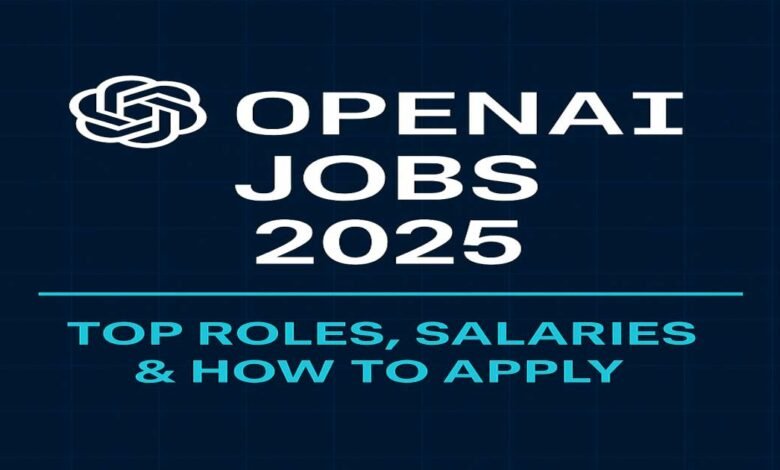Open AI Jobs 2025: Top Roles, Salaries & How to Apply

Introduction: Open AI Jobs
The explosive growth of artificial intelligence has propelled OpenAI into the spotlight as one of the most coveted employers in tech. Open AI Jobs in 2025 span research, engineering, operations, and more, each role contributing to the mission of building safe, beneficial AI systems for humanity. As competition for AI talent intensifies, understanding which positions are available, what compensation looks like, and how to navigate the hiring process has never been more critical for aspiring candidates.
The State of the AI Job Market in 2025
By mid‑2025, global demand for AI talent shows no signs of slowing. Recent compensation analyses indicate total pay for machine learning and AI engineers in the U.S. averages around $246,940, marking an 8% increase year‑over‑year. Meanwhile, government and regulatory roles offer significantly lower packages, highlighting the premium tech organizations place on specialized AI expertise.
Why “Open AI Jobs” Are Unique
- Mission‑Driven Culture
This organization blends cutting‑edge research with a public‑benefit mandate, operating under a hybrid structure focused on safe AGI development. - Competitive Compensation Packages
Offers typically include a robust base salary plus performance‑based participation units, aligning employee incentives with long‑term success. - Interdisciplinary Collaboration
Teams comprise researchers, engineers, policy experts, and designers working side by side, creating a uniquely cross‑functional environment.
Top Roles at OpenAI in 2025
Below are some of the most sought‑after positions across core teams:
| Role | Team | Location | Openings |
| Research Scientist | Research | San Francisco, CA | 12 |
| ML/AI Software Engineer | Applied Engineering | Remote & SF, CA | 25 |
| Forward Deployed Engineer | Technical Success | Tokyo, Japan | 5 |
| User Operations Generalist | Operations | San Francisco, CA | 8 |
| Product Designer | Product | San Francisco, CA | 4 |
| AI Technical Support Specialist | Support | SF & Tokyo | 9 |
| Account Director, Enterprise | Go To Market | Multiple Regions | 6 |
| Administrative Business Partner | Executive Operations | San Francisco, CA | 3 |
Data accurate as of June 18, 2025.
Salary Breakdown & Compensation Trends
Base Salary Ranges
- Entry‑Level Research Scientist: $175K–$225K
- Senior ML/AI Engineer: $300K–$450K
- Staff Software Engineer: $450K–$650K
- Principal Engineer / Research Lead: $600K–$900K
- Executive & Director Roles: $500K–$1M+
Equity & Profit Participation
Beyond base pay, performance units vest over time, rewarding employees based on company performance. These units can add 15%–40% on top of cash compensation, depending on level and tenure.
Benefits & Perks
- Generous paid time off and parental leave
- Comprehensive health, dental, and vision coverage
- Retirement plan with employer matching
- Flexible and hybrid work arrangements
- Relocation assistance and housing stipends for select roles
Key Skills & Qualifications
Core Technical Competencies
- Machine Learning Foundations: Deep understanding of supervised and unsupervised learning, reinforcement learning, and large‑scale neural network training.
- Software Engineering Best Practices: Proficiency in Python, C++, distributed systems, and production‑grade code.
- Research & Experimentation: Ability to formulate hypotheses, design experiments at scale, and interpret complex results.
Soft Skills
- Cross‑Functional Collaboration: Proven success working alongside researchers, designers, and policy teams.
- Communication: Clear, concise writing and speaking skills—essential for publishing research or drafting safety guidelines.
- Adaptability: Comfort with rapid pivots in a fast‑moving research environment.
Educational & Experience Requirements
- Advanced degree (PhD preferred) for research roles; Bachelor’s or Master’s for engineering positions.
- 2+ years of relevant industry or post‑doctoral experience for mid‑level positions; 5+ years for senior roles.
How to Apply for Open AI Jobs in 2025
- Explore Open Positions
Browse the organization’s career listings by team, location, or function. - Tailor Your Resume & Cover Letter
- Highlight AI‑specific projects (e.g., published papers, open‑source contributions).
- Quantify impact (e.g., “Improved model throughput by 30%”).
- Submit Your Application
Apply directly through the portal. Combine your resume, cover letter, and supplementary materials into a single document. - Leverage Referrals
Internal referrals can help prioritize your application. Consider reaching out to alumni or connections working in AI research.
What to Expect in the Interview Process
- Initial Screen (30 min)
Discussion of your background, motivations, and role fit. - Technical Assessments (60–90 min each)
- Coding challenges (Python/C++).
- System design exercises for large‑scale AI pipelines.
- Interview Loop (4–6 discussions)
- Deep dives into past projects.
- Research problem-solving (whiteboard or virtual).
- Team and culture fit sessions.
- Leadership Panel
For senior candidates: discussions on strategy and vision alignment. - Offer & Negotiation
Finalize compensation, performance units, benefits, and start date.
Future Trends in Open AI Careers
- Specialized Safety Roles: Growing emphasis on alignment, interpretability, and robust safety engineering.
- Multimodal & Robotics: Increasing positions that blend vision, language, and physical embodiment of AI.
- Policy & Ethics: Rising need for experts to navigate global regulations and ethical frameworks.
- Product‑Research Hybrids: Roles driving end‑to‑end productization of research breakthroughs.
Conclusion
Open AI Jobs in 2025 offer unparalleled opportunities for those passionate about shaping the future of intelligence. With competitive pay, a mission-driven culture, and roles spanning research to operations, this organization stands out in the crowded AI talent marketplace. A targeted application backed by demonstrable impact and mission alignment will be your first step toward joining a team at the frontier of AI innovation.
Frequently Asked Questions
Q1: What experience is required for entry-level research roles?
Ans: Typically, a PhD and 2+ years of post‑doctoral or industry research experience are expected.
Q2: Are remote positions available?
Ans: Yes, many engineering and operations roles are fully remote or hybrid in select regions.
Q3: How long is the interview process?
Ans: Expect 4–8 weeks from application to offer, depending on role and team availability.
Q4: Can non-technical professionals apply?
Absolutely, there are roles in policy, operations, marketing, and support that value domain expertise beyond core AI research.
Q5: How are performance-based units valued?
Ans: Units vest over 4 years and are linked to company performance metrics; valuation depends on future performance and exit events.
Ready to take your career to the next frontier? Explore “open ai jobs” on OpenAI’s careers portal and embark on a path that could redefine the future of humanity.




